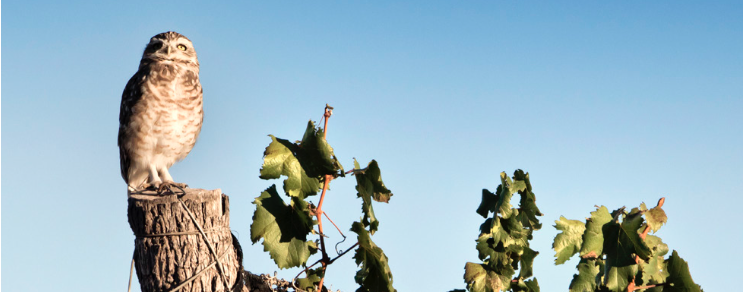
EXPERT
Series Three
SUSTAINABILITY
Sustainability in the Vineyard
All this talk about standards, certifications and plans, but what does sustainability in the vineyard look like in practice? Here are a few common ways the industry is moving towards a better and more environmentally responsible future.
SOIL CONSERVATION
COVER CROPS
Have you ever visited Napa or Sonoma in the winter and seen the spectacular views of gold mustard in the vineyard rows? In place of chemical fertilizers, the plants prevent erosion, increase carbon and nitrogen in soil, and fend against nematodes – a microscopic worm that can damage vines.
COMPOSTING
With hundreds of thousands of tons of grapes crushed each year, the waste is substantial. As a sustainable alternative, wineries are composting the grape stems and pomace (fermented skins and seeds) and recycling it as fertilizer.
PEST MANAGEMENT
FALCONRY
When the grapes are ripe, vineyards face a problem with birds feasting on the unprotected fruit. As an alternative to nets, foil flags and noisemakers, which can be labor intensive and ineffective, some wineries use falcons to patrol the skies during harvest. Falcons scare off the bird intruders and are efficient, covering a large amount of ground quickly.
OWL NESTING BOXES
Rodents like voles, mice and gophers can devastate vines. As an alternative to poison, vineyards place nesting boxes throughout the vineyard to attract new owl populations, which like to hunt over vineyard habitats.

WATER CONSERVATION
Many wineries are converting sprinklers to drip irrigation. This highly efficient watering method can supply vines with the right amount of water, in the right location where they need to produce grape clusters, not excess leaves or vegetation. This results in less water and energy usage, not to mention more concentrated, higher-quality fruit.
ENERGY CONSERVATION
Night harvesting allows the grapes to arrive cooler at the winery, reducing the need for energy-intensive refrigeration. It also promotes better quality wines, as grapes picked at a lower temperature are better able to retain their acidic integrity – a key factor that influences a wine’s structure and quality.
ECOSYSTEM MANAGEMENT
INSECTARIES
Utilized by many biodynamic farmers, an insectary is a garden of plants that attract beneficial insects which are useful in defending crop pests.
ANIMALS
Instead of using tractors; sheep, goats, alpacas, and other animals are deployed to trim the cover crops, all the while fertilizing the soil with their manure and supporting a natural and diverse soil ecology.

